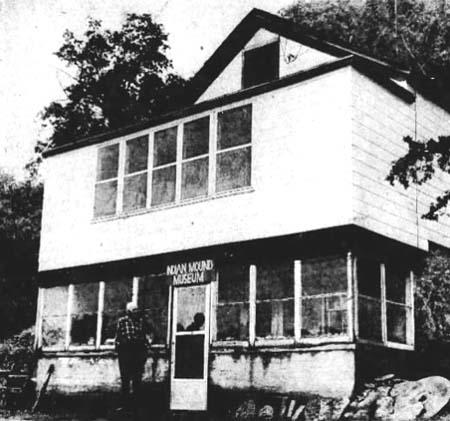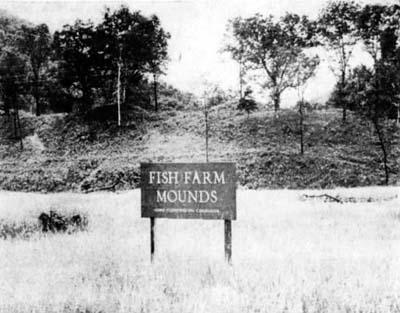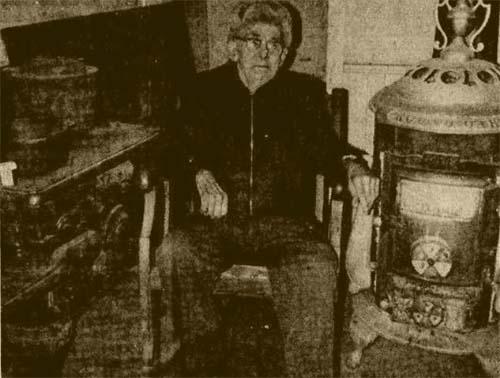![]()
Ed Wild's Indian Mound Museum
The articles from the La Crosse Tribune
were transcribed by Errin Wilker & from the Cedar Rapids
Gazette, by S. Ferrall
At 81, Iowan Still Enthusiastic About Hobby, Sets Up Museum
By Robert C. Gehl
MUSEUM MAKER—Ed Wilde stands atop one of approximately 28 Indian burial mounds on his property along Highway 182 about six miles upriver from Lansing. Wild plans to establish a museum on the site to house his collection of almost 2,500 Indian artifacts.
LANSING, Iowa—Ed Wild was a boy of 10 when he became interested in collecting Indiana artifacts.
Now, 70 years later, Wild, 81, is still enthusiastic about his hobby.
He is an alert and extremely pleasant gentleman, who, after all these years, is getting around to establishing a museum in which he can display his almost 2,500 Indian artifacts.
He recently purchased 320 acres of land along Highway 182 about six miles upriver from Lansing and has carpenters remodeling an old house on the place into a museum and will live next door in a mobile home.
Wild is "very pleased" about his purchase of the 320-acre place because, he says "I have been looking at this place for 30 years, but it was never for sale. When I heard that it was I jumped at the chance to buy it."
He purchased the place through local realtor Mike Connor who wrote the book, "The Strip," about the Warrens area.
A vital factor in his choice of the place for a museum is its proximity to 28 large conical Indian burial mounds located on a flat bench a short distance away and within sight of the highway.
A small tract on which the mounds are located of the property of the state even though on Wild's place. He has provided right-of-way over his property to the site of the burial mounds.
The state has had a crew of young men clearing the mound site of brush and trees.
Wild is quite active and recently was found watching as the land was being cleared on the hillside to provide a clearer view of the mounds on the flat hilltop.
He was born in French Creek Township between New Albin and Waukon and farmed many years. He also lumbered and owned a sawmill for 20 years in the Lycurgus area.
He sold his farm to a son before buying the present place.
He is a widower with six children, plus 28 grandchildren and 15 great-grandchildren.
Wild says the old house on his new place is not large enough to display the entire collection of artifacts, and he says he intends to build an addition to it.
He says he found most of his Indian artifacts in the Upper Iowa River Valley and admits he spent considerable time hiking for them.
He also is interested in collecting coins, which he keeps in a bank vault. He has many foreign coins, including a Roman one that dates back to about 300 B.C.
Then there is his collection of vases, some of which date back to the 18th Century.
"I also have a baby bottle from Egypt that's probably worth half the value of my entire collection," he said.
Wild feels that if he had saved all the artifacts he had collected in his lifetime he would have many more than he now has.
In the meantime he is busily readying his old house for use as a museum and tidying up the entire place for the visitors.
~La Crosse Tribune, La Crosse, WI, November 24, 1966
~*~*~
House Turned Museum Found Not Big Enough - Ed Wild may have to add another room to his self-made museum in Allamakee County
Wild converted a two-story house in French Creek Township into a museum to house his large collection of Indian artifacts, but he has discovered already that the building will not provide sufficient space.
It took Wild almost a year to convert the old farm house, and now he plans to landscape the grounds. Wild also owns a collection of antiques, and it is for these that he needs more display space. The museum is located on State Highway 182 between Lansing and New Albin near Fish Farm Mounds.
~La Crosse Tribune, La Crosse, WI, July 20, 1967
~*~*~
Iowan Creates Museum On Farm Near
Lansing
By Robert C. Gehl

LANSING, Iowa—Ed Wild was a boy of 10 when he became interested in collecting Indian artifacts and today at 82 he is still enthusiastic about his hobby. Wild has been busy all summer readying the new Indian Mound Museum he is establishing eight miles north of Lansing on Highway 182.
He opened the museum to the public earlier this year, but admitted at the time he had plenty of work yet to do before it could be completed in late summer.
Wild purchased 320 acres of land in the area last year and has been remodeling an old house on the place for use as a museum.
A vital factor in his choice of the place for a museum is its proximity to 28 large conical Indian burial mounds located on a flat bench a short distance away and within sight of the highway.
A small tract on which the mounds are located are the property of the state even though on Wild's place. He has provided right-of-way over his property to the site of the burial mounds. The tract upon which the mounds are located was cleared by the state last fall and besides being marked by a Fish Farm Mounds sign is also easily accessible to the public.

Wild and his son, Walter, operate the museum and live next door in a mobile home.
Completed last spring were an Indian relic room, in which he exhibits a wide variety of artifacts in glass-enclosed cases, an antique dish and vase room.
Wild is now building shelves on which to display his own wood carvings.
He was also preparing to restore an antique kitchen and bedroom and remodel the front porch for a display of antique farm tools.
Wild says he will have nearly 3,000 Indian artifacts on display in the museum, including arrowheads, axes, grinders, war clubs, flint knives, pipes, spearheads, pottery and skulls.
He also intends to create a park between the museum and nearby mounds for use by the public.
He says he will charge a "minimal admission" to visit the museum.
He also says that he opened his museum last spring before it was finished because his friends wanted to visit the place and because he was far along enough already to make a visit interesting.
He is an alert and extremely pleasant gentleman who is fond of showing his guests about and describing his collection.
~La Crosse Tribune, La Crosse, WI, August 14, 1967
~*~*~
It's a Quiet Season for NE Iowa Museum
Operator
by Elnora J. Robey

|
Lansing - Though his Indian Mound museum on highway 26 between Lansing and New Albin is open 12 months of the year, winter is a season of relative quiet for Ed Wild, 86.
The museum opened three years ago, displays the products of a lifetime of collecting. Besides a variety of pioneer utensils and equipment, books, furniture, china, fossils, and Indian relics, there are hundreds of curios, ranging from a gun Wild thinks might have been dropped by one of the James gang after its Northfield, Minn., band robbery, to a large 1950 calendar of E.L. Wild and Son, Dealers in Forest Products, showing the Dionne quintuplets at "Sweet Sixteen."
Wild's favorite area is the upstairs room containing his Indian collection. Born and reared in Allamakee county, he found many of the arrow-heads, mortars, pipes, pots, beads, and skulls himself.
"Like other kids, I wold an awful lot for little or nothing before I began to value it myself. Some I found accidentally. My son-in-law had that double mortar under a fence to keep the pigs out. I found him another rock to take its place.
A whole row of mortars, most of them in excellent condition, lines the long wall of the enclosed porch overlooking the Mississippi back-waters.
He also has collected many pieces of jewelry including copper and iron bracelets.
A number of clay replicas among pipestone originals tell a tale of his pipes. "someone stole 14 of my best. These duplicates were a guide for the police in trying to find them."
One Indian relic found in a campground along the Upper Iowa is streaked with gold. According to Waukon's respected geologist, the late Ellison Orr, no deposits of gold were found in Allamakee county, though some gold dust was discovered just across the line in Clayton county.
"That whistle is made of the bone of an eagle wing. I found dozens of small ones in the field below the railroad," Wild noted, pointing out another object.
"When the railroad was put through here, right over there across the highway, they found that the bank they had cut through was actually an Indian mound," he said. Seven skeletons were found and all kinds of artifacts, though they disintegrated. The skeletons were in a sitting posture.
"Not too many years ago, a contractor's crew found Indian skeletons when they were digging a basement in New Albin."
Fish Farm Mounds state park is just north of Wild's museum. This whole corner of the state, bounded by the Mississippi and drained by the Oneota and a network of other streams, was a favorite territory of the Indians, Sac, Fox, and Winnebago villages were north of Wild's place.
Wild believes that his museum was once a fortified place. The original part of the structure has two-foot rock walls and fits snugly into the side-hill. A windowless back room gives one a hint of what the whole building might have been.
Large windows have been cut into the main room, which he said was a store in early times. For more than half a ceentury it was the home of Ed and Frank Fish. At times, commercial fishermen who lived with them kept fish in a large tank in the adjoining spring house.
This combination of sheltered location, spring, and proximity to waterways must have made the place attractive at many times and for many purposes. Wild, whose son Harris took over his farm on French Creek, is the latest to see its advantages.
A glass case houses the largest pot in Wild's collection. What remains of it is about 18 inches in diameter. "The hogs dug that out," he commented.
He is still adding, both by trading and by purchase. Some objects have been loaned for display. "I got this the other day from a neighbor," he said, picking up a rock object. "It's a skinner."
Other items reflect his life. Many of the china room exhibits came from the family of his deceased wife*, whose maiden name was Piers. Mr. and Mrs. William Piers, who were English, owned a 150-piece set of Haviland on display. One Piers heirloom is dated 1381. An item that interests young people is a 300 B.C. Egyptian baby bottle.
Some of the fine china has as unlucky a history as that of the Indians' former property. "My wife's aunt sent two barrels of china to a relative in town," Wild said. "He left them out in his woodshed for years. By the time someone came along who understodd their value, all but three or four pieces had disappeared."
A reminder of Wild's cream-hauling days is a 30-gallon wooden cream 'can' with bolts through the lid. "If the sleigh tipped - as they sometimes did - the cream couldn't spill," he said.
In one case are wooden tools and intricate chains and puzzles he whittled out of wood. On top of it are two birch bark canisters his father made.
Wild lives by the museum in a mobil home.
~Cedar Rapids Gazette, February 6, 1972
*Ed's wife was Maude Alice Piers, d/o William Temple Piers & Mary Madeline Morse
~*~*~
Edward Lewis Wild 1885-1979
Obituary
~*~*~